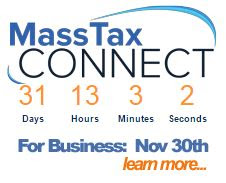Massachusetts / Rhode Island NATP Chapter Annual Meeting & Educational Seminar October 27th 2015
Join the Massachusetts / Rhode Island NATP Chapter on Tuesday, October 27th, 2015 for our Annual Meeting & Educational Seminar. This all day event will be held at the Holiday Inn in Mansfield, MA. Registration details are below, and is handled online by National. Take a look at the details on our speaker and topics provided in this great 8 CE Hour opportunity including continental breakfast, snacks, lunch, vendors and great networking opportunities.
This seminar is limited to the First 100 Registrants!
- After October 26th, please print the form (click for the registration form) and register at the door.
7:00-7:45
AM Registration
7:45-8:00
AM Introduction Walter
Matisewski, CPA- President
Presented by Kathryn M. Morgan, EA, Fellow
NTPI
8:00-9:40 AM Tax Research
Tips & Techniques for Citations, Court Cases & Basis Reconstruction
Good
research is necessary to keep up with the ever-changing tax laws and practical
procedures. This course will include research
methodology, tips and techniques. Case
studies will demonstrate research methods and locations as well as due
diligence procedures for reconstructing basis in capital assets. Participants will learn the hierarchy of
citation authority as well as the standards of reliance on opinions when
working with tax positions. IRS #JSAQG-T-00016-15-I
9:40-9:55 AM Break
9:55-11:35 AM Notice of
Deficiency: It’s NOT The End Of The World!
Judicial Review, Collections Appeals and Collections Due Process
This
presentation will discuss the actions
that need to be taken when a client receives a Statutory Notice of Deficiency
from the IRS. A thorough review of the timing aspects of appeals and Tax Court
filings will be covered as well as case reviews of each option. (IRC §6212)
Participants will learn how to use the IRS Collections Appeal Program
(CAP) or the Collection Due Process (CDP) program to their client’s benefit;
the pros and cons of both programs; and Judicial Review procedures and restrictions. We will also briefly review the integration
of the collections and exams sides of this topic.
IRS #JSAQG-T-00017-15-I
11:35-11:50
AM National Representative- Kim
P. Loewer, EA, ATA
11:50-1:15
PM Annual Meeting, Elections and Lunch
1:15-2:55 PM Living Off The Grid: Bringing Your Client Back Into Compliance
In
this course, we will tackle the
long term non-filer, (I.R.M. Sec. 4.19.17) taxpayers who live by working in an
“under the table” environment. We will
learn the types of situations that make non-filers need to get compliant; what
options for getting and remaining compliant the taxpayer has; how far back the
taxpayer needs to go to get compliant; and review payment options for taxpayers
who have large balances once the returns are filed. IRS #JSAQG-T-00018-15-I
2:55-3:10 PM Break
3:10-4:50 PM Identity Theft:
Everyone Can Become A Victim!
Identity
Theft: It’s a worldwide crime wave and it can
affect every aspect of a taxpayer’s life.
We will discuss how to keep clients safe from this crime, what to do if
they are a victim, steps the IRS is taking to help prevent identity theft, and
ways to speed the process through the IRS Identity Protection Specialized Unit
to get the clients back on track in a timely manner. IRS #JSAQG-T-00019-15-I
Continental
Breakfast, Breaks, and Luncheon included in registration fee.
Special
Offer for the January 7, 2016 State Update Seminar
Sign
up on October 27, 2015 and pay by November 9, 2015 for ½ Price
Speaker - Kathryn M. Morgan, EA, Fellow NTPI

Born and raised in the San Diego California area as a Navy “brat”, Kathy joined the US Air Force straight out of high school. Serving for 13 years as a Military Police Officer in Washington DC, in the Presidential Security Squadron, in the United Kingdom as RAF Greenham Common, assisting in opening the first Ground Launched Cruise Missile base in the European Theater amid large protests, and at Barksdale AFB is NW Louisiana guarding our nations B52 fleet and participating in Desert Storm.
In 1993 Kathy took an early retirement from the military during the force reduction and went to work for the Bossier City Louisiana Police Department as a Police Communications Office and Dispatcher. She worked in this position for 13 years.
While working for the police department, Kathy decided to try something completely new and took a basic income tax class from H&R Block. The rest, as they say, is history. She just completed her 21st year with H&R Block working in the Bossier City Premium office. Kathy earned her Enrolled Agent license in 2002 and has completed the prestigious National Tax Practice Institute Fellowship (NTPI). Kathy has also been the lead writer of the Louisiana State Manual for the H&R Block Income Tax Course for the last five years, assists with upper level courses, and teaches at every level for the company. She proudly holds the titles of Enrolled Agent, Master Tax Advisor, Fellow NTPI, Speaker, Instructor, Representation Specialist and Consultant.
She has been published by several tax research companies, including Parker Tax Publishing and TaxConnections.com. She is a accomplished speaker and instructor on a wide variety of tax issues. Through her company, Puzzled By Taxes?, she offers speaking, writing, and instruction.
Kathy lives and practices in the Shreveport Louisiana area and when not “talking tax” she enjoys spending time with her grandchildren and family, writing and reading.





























